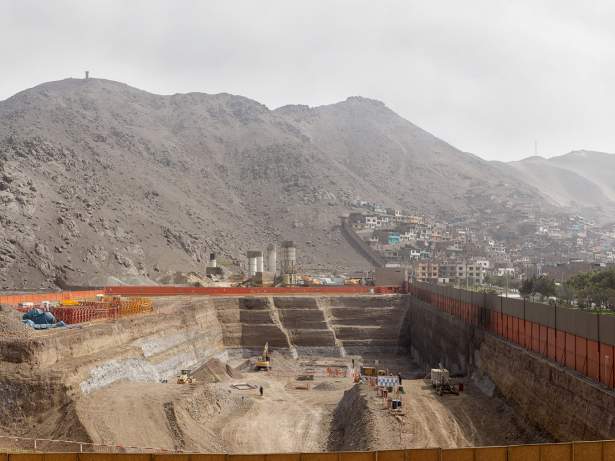Moving Mountains: Extractive Landscapes of Peru by Edi Hirose and Nancy La Rosa

Work by Edi Hirose. Courtesy of the artist.
Old proverbs claim that moving mountains is a miraculous feat. Against the common sense ingrained by traditional sayings, this exhibition makes visible the profound material fact that every day, human activities erase entire mountaintops from the Earth’s surface. Moving Mountains mobilizes visual arts to uncover one of society’s most urgent global issues, one which often remains invisible to the populations residing in protected urban areas. Industry displaces tons of rock from rural hillsides to extract precious metals and coal or to produce concrete for new urban developments. It diverts rivers and drains lakes. Every day, human enterprises radically reshape seemingly stable, unchanging landscapes and with them, entire ecosystems.
Moving Mountains zeroes in on Peru, a country best known in the United States for its impressive Incan ruins, majestic Andean glaciers and the Amazon. Against this popular imaginary of unspoiled nature, Lima artists Edi Hirose and Nancy La Rosa examine how extractive industries—stone-quarrying and mining, specifically—accomplish a proverbially miraculous feat: they literally move mountains. Through works in photography, drawing, printmaking, and video installation—never previously exhibited in the United States—Hirose and La Rosa expose the dramatic transformations of the Peruvian landscape by natural resource extraction. They also show its impact on the everyday life of the settlements that have grown around these industries.
Moving Mountains: Extractive Landscapes of Peru by Edi Hirose and Nancy La Rosa mobilizes visual arts to uncover one of society’s most urgent global issues, one which often remains invisible to the populations residing in protected urban areas. In cities like Austin which pride themselves on being meccas of creative and digital entrepreneurship, it is easy to overlook how powerful industries continuously and irreversibly alter the land and natural environment, often just minutes beyond the city limits. Hirose and La Rosa make palpable the ramifications of corporate power and its reliance on public indifference. They encourage the public to broaden their political and environmental awareness, to find parallels between the land issues in Texas and elsewhere, and to look at this problem’s local and global context.
Additional exhibition support comes from CLAVIS (Center for Latin American Visual Studies), LARA (Latin American Roaming Art Collection), Dorothea L. Leonhardt Foundation, Allison and David Ayers, Kaleta Doolin, and 156 individual donors who contributed through the 2015 HornRaiser and the 40 Hours for The Forty Acres campaigns.
Bios
Born in 1975 to a Japanese-descendant family in Lima, Edi Hirose graduated from the first postsecondary school of professional photography in Peru, Instituto Antonio Gaudí, in 1996. He has shown extensively in Peru, Latin America, and Europe, including solo presentations at the 2013 Istanbul Biennial and 2012 Sao Paulo Biennial. His photographs are in the collections of the Museum of Art of Lima; MoMA, New York; Société Générale, Paris; and numerous private collections in Peru and beyond.
Born in 1980 in Lima, Nancy La Rosa received a BA in printmaking from the Pontifical Catholic University of Peru, where she is currently an MA candidate in Visual Anthropology. Her works in diverse media have been shown in solo exhibitions in Lima and in numerous group shows in Peru and Latin America, including Medellín, Colombia; Trinidad, Bolivia; and Caracas, Venezuela. She has also participated in multiple residencies and site-specific projects.
About the Curator
Dorota Biczel is a PhD candidate in the Department of Art and Art History at The University of Texas at Austin. In 2015–16, she served as the Visual Arts Center Curatorial Fellow. She specializes in contemporary Latin American art in the global context. Her dissertation investigates artistic and architectural interventions and the construction of new publics in Lima during the political transition of the early 1980s. Biczel has published catalog essays, journal articles, and criticism internationally.




